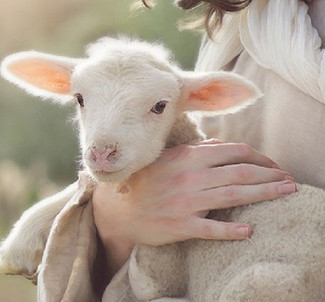4th Sunday of Easter - Good Shepherds
The imagery of sheep and shepherd is very touching and significant in a biblical setting. But in our own time it has become less appealing, less applicable. We certainly recognize that we need the love and guidance of Jesus. We realize that He died for us, that He knows us personally and that He is always with us and concerned for our safety and well being. But God's people no longer see themselves as sheep.
 Nowadays our people are generally much better educated and better equipped to make their own conscious decisions. They are not content to be passive and they are often not submissive. They have come to a new understanding of their dignity and their role as baptized Christians and they realize that they share the call to ministry, to evangelization and to service - that they too are called to be "shepherds."
Nowadays our people are generally much better educated and better equipped to make their own conscious decisions. They are not content to be passive and they are often not submissive. They have come to a new understanding of their dignity and their role as baptized Christians and they realize that they share the call to ministry, to evangelization and to service - that they too are called to be "shepherds."
We tend to forget that when Jesus refers to himself as "shepherd" his intent is to focus more on the role of shepherd and less on the attitude of the sheep. His view was much broader than simply the powerlessness and helplessness of the flock. Instead he was modeling a life-style to which he was inviting all of his followers to share - one of concern and compassion, of service and dedication, one of relentless and abounding love.
In Evangelii Gaudium Pope Francis issued the same call to all Christians, called as we are to be missionary disciples. “Evangelisers thus take on the ‘smell of the sheep’ and the sheep are willing to hear their voice” (EG, 24). It is a challenge for each of us in our various roles of ‘leading’ and ‘shepherding’ others, whether it be our children, our students, our parishioners, neighbors, colleagues or others in the wider community. How do we ‘live among’ and remain close to the little ones, the poor, the vulnerable, those who grieve, and those facing difficult daily challenges, whether they be economic, personal, professional, psychological or spiritual?
The Shepherd speaks of the entire flock. He is leading and addressing the flock who hears his voice. We are that flock. He challenges us to embrace what we have come to adopt since Vatican II, that the church is the people of God and that all the baptized share in the priesthood of believers. We all have a role as shepherds and we all are supported and lead by the voice of the Shepherd.
We must touch the most fundamental needs of people's humanity, and help them to see how uniquely the gift of Jesus and His Gospel fulfill those needs. As disciples our role is first and foremost that of reconciling, healing, comforting and uniting all people. The people of God need shepherds who are in touch with the real circumstances of life, not aloof or ivory towered idealists. Our lives will be marked by compassion and justice, gentleness and reconciliation - by our own willingness to lay down our lives, as did the Good Shepherd.
Maybe it is time for all of us to re-examine just how willing we are to do just that.